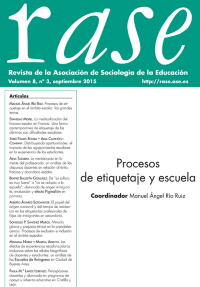When teachers label children of immigrants in secondary school: the role of national origin and lenght of residence
DOI:
https://doi.org/10.7203/RASE.8.3.8391Keywords:
Children of immigrants, academic attainment, labeling, self-fulfilling prophecy, academic discrimination. Abstract
Abstract
This paper explores the process by which teachers construct their perception on the academic performance of children of immigrants. In order to do this, teachers’ discourse is first analyzed and then it is contrasted to immigrant student’s discourse. Information was gathered through focus groups with teachers and in depth interviews to immigrant students, high school counselors and principals. Data from a survey addressed to all students attending the last two years of compulsory education in the municipality of Marbella is occasionally analyzed too. Results show that teachers’ labeling process on immigrant students leads them to build in advance stereotyped expectations towards the latter. Teachers’ perceptions on the influence of both length of residence in Spain and national or ethnic origin are the two key categories structuring this labeling process. Such expectations would be a potential source of educational discrimination as long as they crystallized into an unequal treatment towards these students.
 Downloads
Downloads
Downloads
Published
How to Cite
-
Abstract834
-
PDF (Español)1015
Issue
Section
License
![]()
This work is licensed under a Creative Commons Reconocimiento-NoComercial-CompartirIgual 4.0 Internacional.




